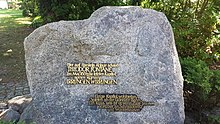Hankel's shelf
Hankels Ablage was a storage place for wood on the Dahme in the area of the former Miersdorf municipality immediately south of the Berlin city limits. It is the setting for several important scenes from Theodor Fontane's novel Irrungen, Wirrungen and was also the place where the poet stayed when he was working on this work in 1884.
history
A storage area for wood etc. was designated as a storage area, which was waiting there to be transported on by ship. Hankels filing is named after the Hankel family who lived there for generations. Friedrich Hankel received a plot of a 1789 acre size in annual lease and then founded the shelf at the Dahme with a fishing house. In 1866 August Hankel pushed through that a stop on the Görlitz railway line was set up and also called Hankels Ablage . In contrast to these historically transmitted facts, the landlord of the inn of the same name near Fontane, also a member of the Hankel family, speaks out against the influx of tourists, but admits that he of course earns good money. In fact, it was the quarter in which Fontane settled the climax and turning point of his novel (the seamstress Lene Nimptsch spends a night here with her lover Botho von Rienäcker, but a visit from Rienäcker's regimental comrades with her lover makes it clear that it is only one night Affair can act and the barriers of class cannot be overcome), known as the “sailors' castle” and extremely popular. In 1890 71 people lived in the village. The population rose sharply in the 20th century, so that in 1925 there were already 272 people living in Hankel's filing.
The former hotel belongs to DESY Zeuthen in the 21st century and contains a small fountain exhibition.
In addition to the scene in Irrungen, Wirrungen, there is also a brief mention of Hankel's filing in Fontane's novel Stine . In both cases, the backdrop serves to portray the main female characters as - in a positive sense - simple and close to nature, and to contrast them with the superficial women with whom the male protagonists should connect in a conventional way.
The descendants of the Hankel family are still based in Zeuthen am See.
literature
- Joachim Kleine: The Hankels on Hankel's shelf - where Theodor Fontane was in the summer . Irmtraud Carl Verlag, Zeuthen 1999, ISBN 3-931133-07-9
- Lieselott Enders : Historical local lexicon for Brandenburg: Teltow (= Historical local lexicon for Brandenburg . Volume 4). Verlag Hermann Böhlaus successor, Weimar 1976.
Web links
Coordinates: 52 ° 21 ' N , 13 ° 38' E

